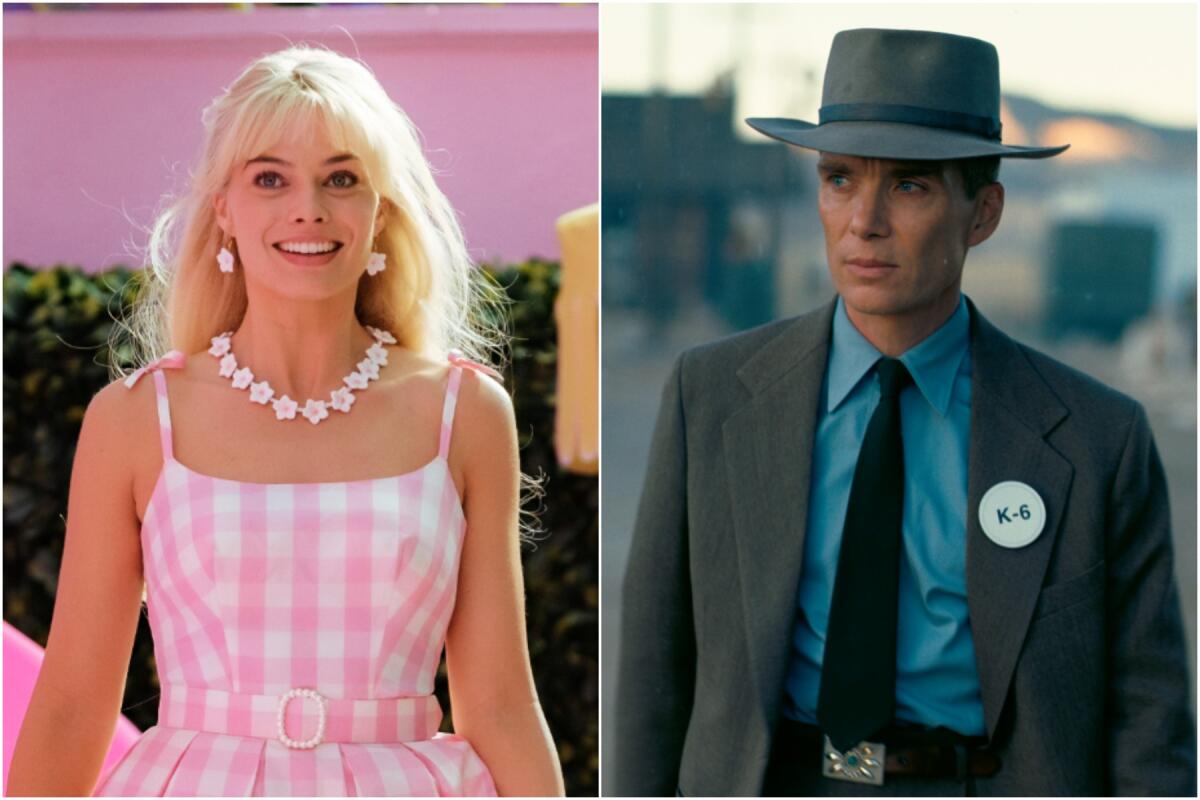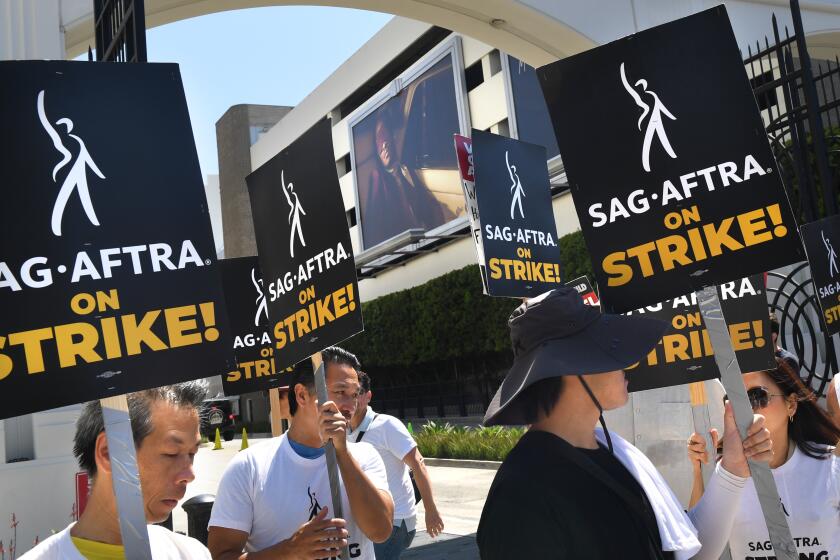The ‘Barbenheimer’ effect should scare the studios into ending the strike

- Share via
Like millions of other Americans, I Barbenheimered this weekend.
Unlike many braver souls, I couldn’t bring myself to do the same-day double feature, so I saw Greta Gerwig’s “Barbie” on Friday and Christopher Nolan’s “Oppenheimer” on Sunday. (We couldn’t find seats within a 15-mile radius for Saturday).
This schedule offered the added benefit of seeing women and girls, including my daughter and her friend, clad in hot (and other shades of) pink, lighting up the crowds of two theater chains like strawberry swirls in a summer ice cream sundae.
And I mean crowds. I haven’t seen lines at theater concession stands and in the ladies’ room like that in years. As I blinked my way out of “Oppenheimer,” the palpable excitement of the multiplex was still high and heart-lifting. Threading through a pretty good demographic representation of Los Angeles, all hyped up on the experience, it was impossible not to think: Studio execs must be s— ...
OK, I can’t say what I actually thought about the digestive reactions of studio heads as they faced the $235-million reality of what they have potentially sacrificed by forcing the Writers Guild of America and the Screen Actors Guild-American Federation of Television and Radio Artists to go on strike.
But if the Alliance of Motion Picture and Television Producers, which represents the studios, thought they could force concessions by continuing to leverage the notion that America is out of the moviegoing business, “Barbenheimer” proved them wrong.
Warner Bros.’ ‘Barbie’ and Universal Pictures’ ‘Oppenheimer’ both opened in theaters this weekend. Which movie ruled the domestic box office?
PG-13 “Barbie” grossed $155 million in the United States and Canada while the R-rated “Oppenheimer” earned $80-plus million. Together, they helped make this the highest-grossing weekend since the start of the COVID-19 pandemic and the fourth-highest ever.
Ever.
Yeah, that’s the time you want to have caused a full-on work stoppage — right slap in the middle of a record-breaking week at the box office.
How many future “Barbenheimer” weekends are the studios willing to sacrifice by their recalcitrance?
It’s one thing to plead poverty, and an irrevocably downward-spiraling film industry, when the box office is in a slump. It’s more difficult when a fun, female-empowering journey into Barbieland links arms with an earnest, arty film about the man behind the atomic bomb to create a revitalized movie audience.
Complete with, as my colleague Christi Carras recently noted, memes, T-shirts and, of course, TikTok videos.
The studios may remain unmoved by the humane reasons they should return to the bargaining table — you know, the hundreds of thousands of entertainment industry workers now unemployed and the devastating effect the industry-wide shutdown is having on communities that rely on the production economy.
But if they aren’t concerned with the picket line, hopefully they’ll have a different reaction to the bottom line. Instead of drafting off the weekend’s success, we now have a bunch of moviegoers all revved up with no place to go. For the foreseeable future.
I guess this is why executives make the big bucks.
“Barbie” and “Oppenheimer” were highly anticipated films that benefited from publicity campaigns that squeaked under the wire of the SAG-AFTRA strike. (“Oppenheimer” stars including Cillian Murphy, Emily Blunt and Matt Damon were attending the film’s London premiere when the strike was called and they walked out.)
Films slated to debut next weekend, and for however many months the strike lasts, will not be so lucky. And though “Meg 2: The Trench” may not feel the pinch — you’re either into ginormous prehistoric sharks or you’re not — some finished films, including “White Bird,” starring Helen Mirren and Gillian Anderson, have already been pulled from the August lineup in part because their stars cannot do publicity.
Many others, stalled in some stage of consternation or production, have seen their release dates pushed to 2024 and, in the case of the “Dirty Dancing” sequel and the next “Avatar” film, 2025.
With luck, we could see an increased audience for independently produced movies — as I watch my daughter replace her “Barbie” outfit with one for “Oppenheimer,” I would urge campaigns leaning into fashion — but in the meantime, this weekend could not have sent the studios a more pointed message if it had been directly dictated by the WGA and SAG-AFTRA.
The business may have changed, but two simple facts remain: If you want to make money in the movie business, you need to make movies.
And to make movies, you need writers and actors.
Warner Bros., which produced “Barbie,” and Universal, which produced “Oppenheimer,” may be feeling pretty good right now. But the strikes ensure that the joy will be short-lived. Having reminded people how much fun it is to go to the movies and gotten them back in pre-pandemic numbers, the studios appear willing to bring audiences up short.
Column: The studios thought they could handle a strike. They might end up sparking a revolution
With writers and actors on strike, the studios have a full-blown labor revolt on their hands — and they have no one but themselves to blame.
Sorry, folks, I know we’ve been doing our best to get you back to the theaters, but now you’ll have to wait another year or two for whatever film you were looking forward to.
Honestly, Nicole Kidman and her sparkly pantsuit should sue.
In the entertainment business, timing is everything, something the AMPTP does not, strangely enough, appear to understand.
Bumping my way through throngs of excited moviegoers snapping selfies in front of “Barbie” displays and “Oppenheimer” posters and juggling buckets of popcorn, trays of nachos and enormous sodas, I suddenly thought of KCET.
In 2010, KCET dumped PBS, which had become, according to many, a fusty old money pit. A few months later, “Downton Abbey” premiered on Masterpiece Classic and became one of TV’s biggest hits. KCET had given up right before the miracle.
Unlike KCET, however, the studios have a second chance. A swift end to the strike could save all those future box office hits from draining their budgets with delays or withering away altogether.
Not every movie is going to be a hit. Hollywood has always been a gambling town where the losses outnumber the wins; as “Barbenheimer” reminded us, the wins are big enough to cover the losses and then some.
But as every gambler knows, you can’t win if you don’t play.
More to Read
Only good movies
Get the Indie Focus newsletter, Mark Olsen's weekly guide to the world of cinema.
You may occasionally receive promotional content from the Los Angeles Times.













